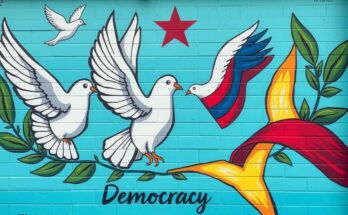In an unfolding tragedy in Colombia’s northeastern Catatumbo region, the conventional peace narrative is crumbling. Following an attack by the National Liberation Army (ELN) on the 33rd Front, President Gustavo Petro invoked emergency powers, imposing curfews and deploying over 5,000 soldiers, intensifying a conflict that has displaced nearly 92,000 individuals. Local social movements criticise this militarisation, labelling it inconsistent with the promised Total Peace strategy, as communities face both humanitarian crises and violent upheaval.
As the conflict escalated throughout March, data revealed an alarming situation: over 56,000 individuals fled their homes, with many seeking safety in Tibú, Ocaña, and Cúcuta. Reports of violence, including 80 fatalities—comprising former guerrillas and community leaders—indicate a troubled landscape reflecting deep-rooted systemic neglect and human rights violations. Humanitarian access remains critical but perilous, as the ELN’s dominance hampers efforts.
International agencies, such as the UN and grassroots groups, have rallied to send aid, yet challenges persist. Elizabeth Dickinson of the International Crisis Group noted the complexities posed by the ELN’s influence over humanitarian operations in the region. Emergency evacuations have been undertaken for those at risk, particularly former members of demobilised guerrilla factions currently facing threats from the ELN.
Giovanni Rizzo from the Norwegian Refugee Council highlighted the humanitarian crisis ignited by the revival of armed clashes. Years of government neglect have compounded the tensions, leaving a small Indigenous community, the Barí, particularly vulnerable. They face food insecurity and ongoing violence, stressing the need for international recognition of their plight amidst a vast crisis that often silences their voices.
Despite the historic presence of armed groups, social leaders have emerged from Catatumbo, often advocating for peace amid the chaos. Yet, these leaders face significant risks in a place recognised as perilous for human rights defenders. As coca cultivation continues to dominate the economy, attempts at crop substitution programmes have faltered due to a lack of state support and ongoing violence, perpetuating a cycle of poverty and conflict.
Under severe economic strain, President Petro’s recent announcement to incentivise farmers for participating in crop substitution lacks the urgency needed to address the humanitarian crisis. Despite these intentions, increased violence and militarisation threaten to further disenfranchise already vulnerable communities.
The appointment of Defence Minister Pedro Sánchez has sparked concern, given his background and proposals for heightened militarisation. Critics argue that his views echo historical narratives that criminalise social movements. As Catatumbo grapples with these challenges, the shaping of its future hangs in a delicate balance, compelled by forces both local and international, as it stands at the crossroads of opportunity and increased strife.
Colombia’s Catatumbo region faces a humanitarian crisis as military responses to conflict led by the ELN have displaced nearly 92,000 people. Local activists criticise the government’s militarised approach as inconsistent with peace efforts. Indigenous communities like the Barí endure systemic neglect and human rights violations, while efforts to shift from coca cultivation to legal crops have largely failed amid rising violence and poverty. The appointment of a controversial Defence Minister raises further concerns about the militarisation of social movements in the region.
The ongoing crisis in Catatumbo highlights a complex interplay of militarisation, displacement, and humanitarian needs exacerbated by systemic neglect. While attempts to address poverty through legal economic opportunities exist, the challenges remain staggering. As military presence grows alongside social struggles, the region faces a precarious future where the search for peace and justice seems increasingly elusive. Each voice matters, yet many remain unheard amidst the clamor of violence and political unrest.
Original Source: www.fairplanet.org



